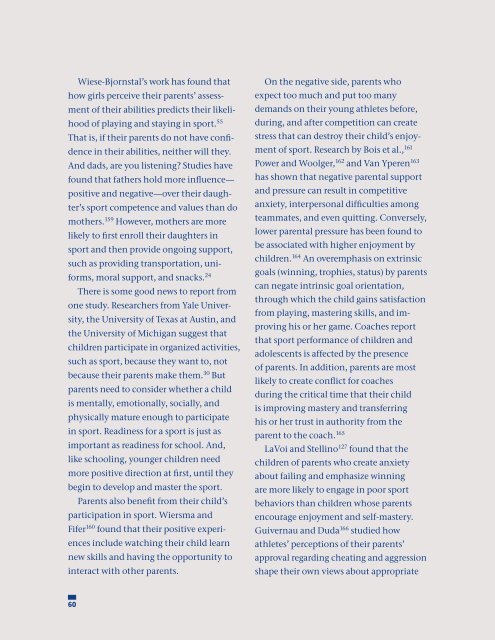True-Sport-Report
You also want an ePaper? Increase the reach of your titles
YUMPU automatically turns print PDFs into web optimized ePapers that Google loves.
Wiese-Bjornstal’s work has found that<br />
how girls perceive their parents’ assessment<br />
of their abilities predicts their likelihood<br />
of playing and staying in sport. 55<br />
That is, if their parents do not have confidence<br />
in their abilities, neither will they.<br />
And dads, are you listening? Studies have<br />
found that fathers hold more influence—<br />
positive and negative—over their daughter’s<br />
sport competence and values than do<br />
mothers. 159 However, mothers are more<br />
likely to first enroll their daughters in<br />
sport and then provide ongoing support,<br />
such as providing transportation, uniforms,<br />
moral support, and snacks. 24<br />
There is some good news to report from<br />
one study. Researchers from Yale University,<br />
the University of Texas at Austin, and<br />
the University of Michigan suggest that<br />
children participate in organized activities,<br />
such as sport, because they want to, not<br />
because their parents make them. 30 But<br />
parents need to consider whether a child<br />
is mentally, emotionally, socially, and<br />
physically mature enough to participate<br />
in sport. Readiness for a sport is just as<br />
important as readiness for school. And,<br />
like schooling, younger children need<br />
more positive direction at first, until they<br />
begin to develop and master the sport.<br />
Parents also benefit from their child’s<br />
participation in sport. Wiersma and<br />
Fifer 160 found that their positive experiences<br />
include watching their child learn<br />
new skills and having the opportunity to<br />
interact with other parents.<br />
On the negative side, parents who<br />
expect too much and put too many<br />
demands on their young athletes before,<br />
during, and after competition can create<br />
stress that can destroy their child’s enjoyment<br />
of sport. Research by Bois et al., 161<br />
Power and Woolger, 162 and Van Yperen 163<br />
has shown that negative parental support<br />
and pressure can result in competitive<br />
anxiety, interpersonal difficulties among<br />
teammates, and even quitting. Conversely,<br />
lower parental pressure has been found to<br />
be associated with higher enjoyment by<br />
children. 164 An overemphasis on extrinsic<br />
goals (winning, trophies, status) by parents<br />
can negate intrinsic goal orientation,<br />
through which the child gains satisfaction<br />
from playing, mastering skills, and improving<br />
his or her game. Coaches report<br />
that sport performance of children and<br />
adolescents is affected by the presence<br />
of parents. In addition, parents are most<br />
likely to create conflict for coaches<br />
during the critical time that their child<br />
is improving mastery and transferring<br />
his or her trust in authority from the<br />
parent to the coach. 165<br />
LaVoi and Stellino 127 found that the<br />
children of parents who create anxiety<br />
about failing and emphasize winning<br />
are more likely to engage in poor sport<br />
behaviors than children whose parents<br />
encourage enjoyment and self-mastery.<br />
Guivernau and Duda 166 studied how<br />
athletes’ perceptions of their parents’<br />
approval regarding cheating and aggression<br />
shape their own views about appropriate<br />
60


